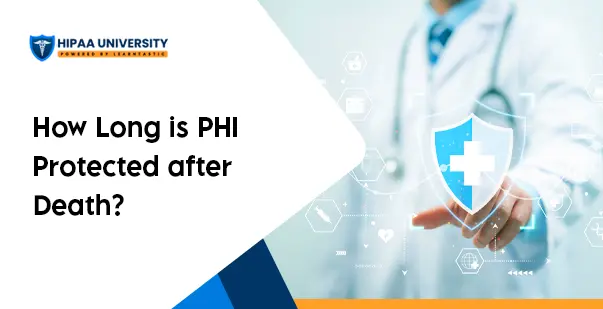Learn How Long is PHI Protected After Death?

August 26, 2024
Table Of Content(s)
- Introduction
- How many years after a person’s death is PHI protected?
- Who and under which circumstances can a deceased person’s phi be accessed?
- What are the exceptions to PHI protection after death?
- How to request access to a deceased loved one’s PHI?
- What are the consequences of violating PHI after death?
- Conclusion
When we think of PHI or Protected Health Information, our mind focuses on how it’s safeguarded during our lifetime. But it is equally important to understand how it is handled after death. When revealing personal information to healthcare facilities, did this question pop up in your head- “how many years after death is PHI protected?”
The breach of protected health information has affected over 146 million people in the US. Therefore the Health Insurance Portability and Accountability Act sets extremely strict guidelines to protect PHI of a person after demise. But even with HIPAA in place, the handling of a deceased person’s PHI involves a complex interplay of regulations.
This blog will simplify the process of data handling following an individual’s death.
How many years after a person’s death is PHI protected?
When a person passes away, their health information doesn’t immediately become public. The privacy of their medical records is still safeguarded by law, even after death. But for how long is this information protected?
- 50 Year Rule: Under the Health Insurance Portability and Accountability Act (HIPAA), PHI remains protected for 50 years after an individual’s death. During this period, the same privacy rules that applied during their lifetime continue to govern their health information.
- Authorized Access: Only specific individuals, such as personal representatives or executors of the deceased’s estate, can access the PHI of the deceased within this 50-year timeframe.
- Exceptions to the Rule: There are exceptions where PHI can be disclosed without authorization, even after death. These include circumstances like public health concerns, organ donation processes, or legal requirements like court orders.
- State Laws May Vary: While HIPAA sets a federal standard, some states may have additional regulations that extend or modify the protection of PHI after death, depending on the jurisdiction.
- Beyond 50 Years: After the 50-year period has elapsed, the deceased’s PHI is no longer covered under HIPAA. At this point, the information is generally treated as historical data, though other legal or ethical considerations may still apply.
Who and under which circumstances can a deceased person’s PHI be accessed?
After a person passes away, their personal health information (PHI) doesn’t lose its confidentiality. But certain individuals and entities may need access to this information for specific reasons. Understanding who can legally access such PHI and under what circumstances is important to ensure privacy while addressing necessary legal and medical concerns.
- Personal Representatives: The executor or administrator of the deceased’s estate typically has the legal right to access PHI. They may need this information to manage the property or fulfill the deceased’s last wishes. They might also need the data to handle other legal responsibilities.
- Family Members: In some cases, family members can access a deceased person’s PHI, especially if they were involved in the individual’s care. Access may be granted to help with the ongoing care of the deceased’s family members.
- Legal Requirements:Courts or law enforcement agencies may request access to PHI as part of an investigation or legal proceeding. This could include matters like verifying the cause of death, resolving disputes, and fulfilling legal obligations.
- Public Health Authorities: Public health agencies may access PHI for reasons related to public safety. This can be used for tracking disease outbreaks or identifying potential health risks to the community.
- Organ and Tissue Donation: In situations where organ or tissue donation is involved, PHI may be accessed by authorized organizations to facilitate the donation process.
- Research Purposes: Researchers may be granted access to PHI under specific circumstances. This includes conditions where data is vital for studies or could benefit public health. However, strict regulations govern how this information is used and disclosed.
Read More: What is Considered Protected Health Information Under HIPAA?
How to request access to a deceased loved one’s PHI?
Gaining access to a deceased loved one’s Personal Health Information (PHI) can be important for various reasons. It can be needed for managing their property, understanding their medical history, or addressing legal matters.
However, the process for requesting this information is governed by specific rules.
Understanding these requirements can help you obtain the necessary records smoothly, without breaching the law.
Here are the steps to request access to deceased person’s data:
- Identify Your Legal Role: Determine whether you are the personal representative, executor, or administrator of the deceased’s estate. This legal status is typically required to access PHI.
- Gather Required Documentation: Prepare essential documents, such as a death certificate, proof of your legal authority (e.g., a court order appointing you as executor), and identification. Some institutions may also require a copy of the deceased’s will or other legal documents.
- Contact the Healthcare Provider: Reach out to the healthcare provider or institution where your loved one received care. Request information on their specific process for releasing PHI and the forms you may need to complete.
- Complete the Necessary Forms: Fill out any forms provided by the healthcare institution, which may include a request for medical records or an authorization form. Be sure to provide all required details to avoid delays.
- Submit Your Request:Submit the completed forms, along with the required documentation, to the healthcare provider. This can often be done in person, by mail, or electronically, depending on the provider’s policies.
- Follow Up if Needed: After submitting your request, follow up with the healthcare provider to ensure your request is being processed. Be prepared to provide additional information or clarification if requested.
- Understand Potential Costs: Be aware that there may be fees associated with copying and providing the records. Ask about these costs upfront to avoid surprises.
- Know Your Rights: If your request is denied, you have the right to ask for the reason and to seek legal advice if necessary. Understanding your rights under HIPAA and state laws can help you demand access to the information you need.
What are the consequences of violating PHI after death?
Even after someone has passed away, their personal health information (PHI) remains protected by law. Violating these laws can have serious legal and financial consequences. It can impact individuals and organizations alike. Understanding the potential repercussions of mishandling a deceased person’s PHI is important, especially for healthcare providers, legal representatives, and anyone involved in the management of sensitive information.
- Legal Penalties: Violating PHIprotections can lead to significant legal penalties under the Health Insurance Portability and Accountability Act (HIPAA). This may include fines that range from thousands to millions of dollars, depending on the severity of the violation.
- Civil Lawsuits: Families of the deceased may file civil lawsuits if their loved one’s PHI is improperly disclosed. These lawsuits can result in further financial damages and legal fees for the responsible parties.
- Reputational Damage: Organizations that fail to protect PHI after death can suffer severe reputational harm. Loss of trust from patients, clients, and the public can have long-lasting effects on a company’s business and standing in the community.
- Criminal Charges: In extreme cases, especially where the violation is intentional and malicious, individuals responsible for disclosing PHI may face criminal charges. This can lead to imprisonment and additional fines.
- Loss of Licensure or Accreditation: Healthcare providers and institutions found in violation of PHI protections may risk losing their licenses, certifications, or accreditations, further impacting their ability to operate.
- Increased Regulatory Scrutiny: A violation of PHI protections can trigger increased scrutiny from regulatory bodies, leading to more frequent audits and investigations. This can strain resources and create ongoing operational challenges.
- Personal Accountability: Individuals who violate PHI, even unknowingly, may face disciplinary action, including job loss, suspension, or other professional consequences.
Conclusion
To answer “how many years after death is PHI protected”- under the Health Insurance Portability and Accountability Act (HIPAA), PHI is safeguarded for 50 years, post a person’s death. This legal framework ensures that sensitive health information remains confidential. This protects the deceased’s dignity and respects the privacy of their surviving loved ones.
As data privacy laws evolve, the approach to PHI might change too. But by keeping few principles intact, like respect, commitment to privacy, protection and laws, data breaches can be eliminated entirely.
Remember, ongoing training and understanding of privacy laws is of utmost importance when it comes to ethical handling of personal data.





